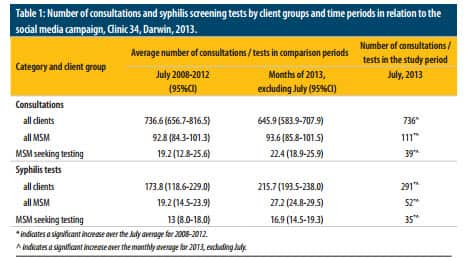Australian researchers have used the gay dating app to effectively combat a small outbreak of syphilis in Darwin.
The study, carried out by the Northern Territory Department of Health and the Northern Territory AIDS and Hepatitis Council (), was launched after a number of men tested positive for the infection between February and July 2013.
The outbreak was contained to men who have sex with men so researchers decided to use the gay hook-up app Grindr to get messages out to them about testing.
Kim Gates, executive director of the NTAHC, said results released this month showed just how effective the messages had been.
"There was a significant increase in the number of men getting tested for STIs [after the advertising came out]," she said. "It was at least double what the normal testing rates are for each clinic in the territory."
A new wave
Christopher Fairley, professor of public health at and director of , said the Grindr campaign signaled a new wave in communicating public health messages.
"Before, we read newspapers and then TV came along and we got it from there, and now there are all sorts of different ways to get information out and and this is just another example of a good way to do it," he said. "This campaign has been extremely effective."
"There was a significant jump in the number of men getting tested for STIs."
Kim Gates said these technologies could even be more effective than the traditional models.
"I'm aware that we had a similar outbreak of syphilis in Darwin a couple of years ago and that time we had a different approach in that we put posters and messages up in places where gay men were frequenting or where we thought sexually adventurous activity might be occuring and certainly there was an increase in testing at that time but nowhere near as great as the increase this time around," she said.
"I think with the changing technologies in today’s society we actually have to be looking more and more at social media and other ways of getting those messages out."
In Brazil, the country's Health Ministry during the country’s annual Carnival festival.
As part of that effort, the Ministry made fake profiles on the app which sent messages out to would-be daters about the dangers of unprotected sex.
While that campaign aimed to target a wide group of people, the Darwin study was focused on the city's small gay male community being affected by syphilis.
In 2001 it was estimated that there were only 647 men in Darwin who identified as gay or bisexual, and Professor Fairley said the app made it easier to reach them.
"This software app and the way you can identify people just living on that particular area and focus on just them with the message is incredibly clever," he said.
"I think with the changing technologies in today’s society we actually have to be looking more and more at social media and other ways of getting those messages out."
But is there some irony in using hook-up apps - that often facilitate sexual encounters - to combat sexually transmitted infections?
Kim Gates said no.
"Sexually adventurous people - gay, straight or whatever - are going to participate in that type of activity regardless," she said. "As far as we were concerned, [Grindr] was the best way to reach that audience because of they're on the site looking to hook up and have sex - what better way to get those messages out?"
The numbers
The Grindr campaign lasted 27 days from July 17 and 12 August and had 9,812 overall views, including 1,987 unique views, in that time.
By those figures, each user was exposed to one of the messages five times in the campaign period. Results showed a sharp increase in the number of men seeking syphilis screening tests in July, corresponding with the time period of the campaign.
Results showed a sharp increase in the number of men seeking syphilis screening tests in July, corresponding with the time period of the campaign.

The increase in testing was not seen in all patients to the clinic and researchers said that showed a direct link to the campaign.
But the results also showed that in the month following, testing numbers went rapidly down again.
Professor Fairley said the downturn was a reminder that providing solid health services was the priority.
“These sorts of things are great for short-term messages but they must be backed up by sustainable changes to health services that facilitate them,” he said.
But Ms Gates said the drop off was actually a good sign.
"That actually just proved that we were able to contain the outbreak," she said.
"The message that we wanted to get out reached the audience we wanted it to reach. People went to the clinic, got tested, and those who were positive were treated and therefore no further transmissions."

